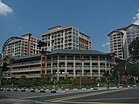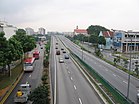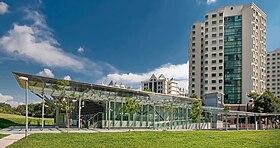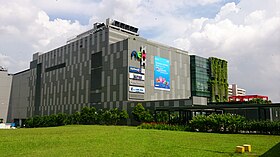Serangoon New Town
| Serangoon | |||||||
|---|---|---|---|---|---|---|---|
| Planning Area and HDB Town | |||||||
| Other transcription(s) | |||||||
| • Chinese | 实龙岗 | ||||||
| • Pinyin | Shí lónggǎng | ||||||
| • Malay | Serangoon | ||||||
| • Tamil | சிராங்கூன் | ||||||
From top left to right: Terraced housing in Serangoon, HDB flats in Serangoon North, Serangoon Viaduct, Lorong Chuan MRT Station, Nex
|
|||||||
| Location of Serangoon within Singapore | |||||||
| Coordinates: 1°21′19.28″N 103°52′4.33″E / 1.3553556°N 103.8678694°E | |||||||
| Country |
|
||||||
| Region |
|
||||||
| CDCs | |||||||
| Town councils |
|
||||||
| Constituencies | |||||||
| Government | |||||||
| • Mayors |
Central Singapore CDC North East CDC South East CDC
|
||||||
| • Members of Parliament |
Aljunied GRC Ang Mo Kio GRC Marine Parade GRC
|
||||||
| Area | |||||||
| • Total | 10.1 km2 (3.9 sq mi) | ||||||
| • Residential | 1.63 km2 (0.63 sq mi) | ||||||
| Population (2015) | |||||||
| • Total | 120,670 | ||||||
| • Density | 12,000/km2 (31,000/sq mi) | ||||||
| Demonym(s) |
Official
Colloquial
|
||||||
| Postal districts | 19, 28 | ||||||
| Dwelling units | 21,293 | ||||||
| Projected ultimate | 30,000 | ||||||
Central Singapore CDC
North East CDC
South East CDC
Aljunied GRC
Ang Mo Kio GRC
Marine Parade GRC
Official
Colloquial
Serangoon (Chinese: 实龙岗, Tamil: சிராங்கூன்) is a planning area and residential town located in the North-East Region of Singapore.
Serangoon is bordered by these planning areas - Sengkang to the north, Hougang to the east, Ang Mo Kio and Bishan to the west, as well as Toa Payoh to the south. Serangoon planning area has a total of seven subzones: Serangoon Central, Lorong Chuan, Upper Paya Lebar, Serangoon Gardens, Serangoon North, Seletar Hills and Serangoon North Industrial Estate.
Tamil Muslim traders from India pioneered the settlement of Serangoon in the early 19th century. Serangoon Road was first identified as a bridle path in 1821, and by 1822 it had reached the present Woodsville Corner. A road was proposed in 1822 and by 1827 the road reached the Serangoon River.
It is difficult to say what the word Serangoon actually means. The etymology of the word is uncertain. The most plausible view holds that it was derived from a small marsh bird, the burong ranggong, which was common in the swamps of the Serangoon River (formerly the Rangon River). It had a black back, white breast, long, sharp bill, grey crest, long neck and unwebbed feet.
On early maps of Singapore, the name of the area is called Seranggong. Se is short for satu, or "one", in Malay. An alternative derivation is offered by Haji Sidek, an amateur etymologist interested in Malay place names, who speculates that the name Serangoon is derived from the Malay words diserang dengan gong, which means "to be attacked by gongs and drums". According to Haji Sidek, people used to go to Benut in Johore through the Serangoon area and had to use gongs to frighten off wild animals and snakes which used to roam the jungle covered area. Serang dengan gong gradually became Serangoon over the years.
...
Wikipedia






